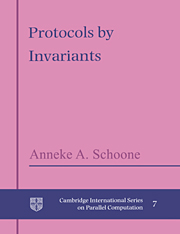5 - Commit Protocols
Published online by Cambridge University Press: 22 March 2010
Summary
Commit protocols are used for concurrency control in distributed data bases. Thus they belong to the application layer. For an introduction to this area we recommend the book by Bernstein et al. [BHG87, Chapter 7].
If a data base is distributed over several sites, it is very possible that a data base operation which is logically a single action in fact involves more than one site of the data base. For example, consider the transfer of a sum of money sm from one bank account to another. The balance of the first bank account has to be decreased by sm, while the balance of the second has to be increased by sm. These two subactions might have to take place at different sites. It is imperative that both subactions are executed, and not one. If it is not possible to execute one of them, e.g. because its site is temporarily down, they should both be not executed.
In data base management such a logically single action is called a transaction, and it should behave as if it is an atomic action. At some point in the execution of the transaction it has to be decided whether the transaction is (going to be) executed as a whole and will never be revoked (commit), or that the transaction cannot be completed, and parts already done will be undone (abort). In general, an algorithm to ensure that the transaction can be viewed as an atomic action is called an atomic commitment protocol. Thus all processes participating in an atomic commitment protocol have to reach agreement upon whether to commit or to abort the transaction under consideration.
- Type
- Chapter
- Information
- Protocols by Invariants , pp. 159 - 190Publisher: Cambridge University PressPrint publication year: 1996



